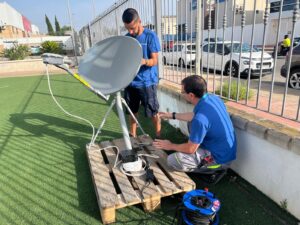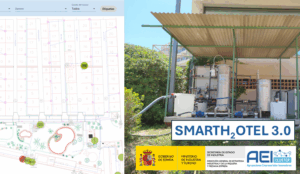Yarivith Carolina González, born in 1988 in Barquisimeto, Venezuela, has excelled greatly in the scientific field thanks to her dedication and love for chemistry. With a degree specializing in chemistry, this young woman also holds two master’s degrees, one in environmental sciences and another in Education, Environment, and Sustainable Development. Currently, she is completing her Ph.D. in Chemistry at the University of San Luis, Argentina, a stage she has achieved thanks to a scholarship from CONICET.
Since she was a child, González has felt a great curiosity for science, especially for laboratories. “I’ve always been fascinated by laboratories since I was a child,” she commented in an interview. At the University of San Luis, she has found her second home, where she is currently researching new methodologies for recycling lithium recovered from electrochemical batteries.
Thanks to her advances in the Extractive Metallurgy research group at UNSL and in collaboration with the Institute of Chemical Technology of Argentina, Yarivith has been awarded the Princess of Girona International Prize 2024. This award also recognizes her contribution to promoting environmental education and science in schools in Latin America.
The young researcher affirms that this recognition is due to both her academic work and her social work. Regarding her scientific project, Yarivith explains that her thesis focuses on recycling lithium from mobile phone and electric vehicle batteries. Using physical-chemical processes such as carbo-reduction or carbochlorination, her team is able to recover critical metals from electrochemical cells.
“Through physical-chemical processes like carbo-reduction or carbochlorination, we are able to recover critical metals from electrochemical cells,” affirms González, highlighting the capacity of her research to generate a positive impact on the circular economy and sustainability in Latin America.
In the social sphere, Yarivith has worked for years in various NGOs in Venezuela. Through environmental volunteering, she has brought science closer to educational institutions, schools, and universities in a more inclusive way. “It’s very nice to see how planting this grain of sand makes a difference,” she expresses. Many of the communities she has worked with are now developing their own innovations and new environmental care methodologies.
From her perspective, the biggest challenge for researchers is to achieve the transfer of science to society. According to her, “we are all scientists because life is a laboratory and science is a social service that must provide solutions to the various challenges that affect us today.”
One of the biggest challenges in implementing sustainable methods for recycling lithium-ion batteries on an industrial scale is to ensure that these optimized methodologies in the laboratory are adopted by the industry. With the collaboration of her colleagues, Yarivith has succeeded in patenting many of her methodologies. Her dream is to have a large recycling plant in South America and contribute to the sustainable development goals and circular economy of the continent.
González emphasizes the importance of battery recycling for sustainability in Latin America, a continent that, while it may not have the same volume of electric cars as Europe or the US, does have a lot of electronic waste.
The Princess of Girona award has been a recognition of both her scientific and social work, something that González considers a great honor. “It had been worth being a volunteer and going out into the streets with children dressed as a spectacled bear or filling my house with plastic to do recycling workshops,” she expressed with emotion.
For those who want to pursue a research career, Yarivith recommends keeping an open mind and being resilient in the face of any limitations that may arise. As for her future plans, she hopes to continue contributing to the field of environmental chemistry and sustainable development, and does not rule out the possibility of exploring new areas such as the synthesis of new materials or research in other sustainable chemistries.
via: MiMub in Spanish









